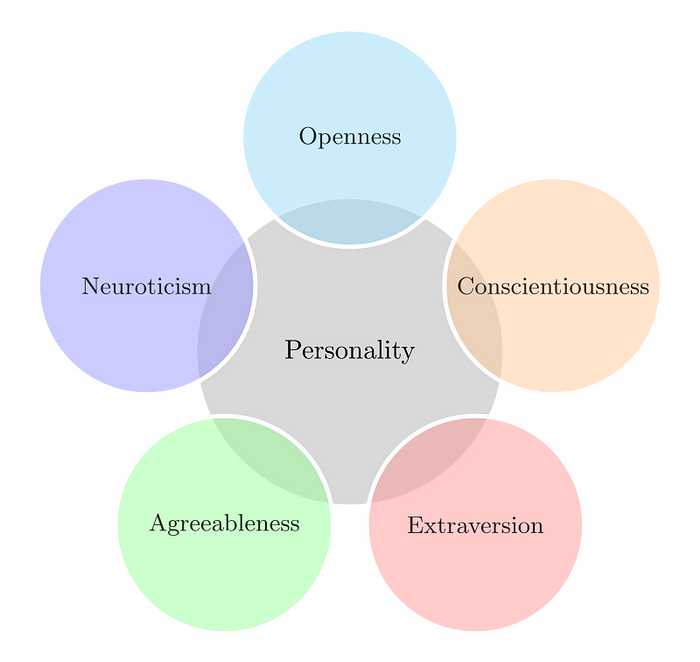🏷️ Categories: Behavior, Decision making and biases
Introduction
Do you feel that things don’t work out the way you want them to, even though you do your best?
In the search for success, many attribute the achievement of their goals only to innate talent and others think that they do not achieve them because they do not have that talent or luck that others have.
However, what if I told you that talent is not the determining factor for success? Did you know that there are traits and skills that anyone can develop to increase their chances of having good luck in life?
Let’s see now how you can increase your luck and what it depends on.
Your personality influences your luck
The Big Five model (Rothmann & Coetzer, 2003) is one of the personality models with the most scientific validity at present. It is based on categorizing personality under 5 major traits:
Openness to experience (inventive/curious vs. constant/cautious).
Meticulousness (efficient/organized vs. extravagant/uncaring)
Extraversion (extroverted/energetic vs. solitary/reserved)
Agreeableness (friendly/sympathetic vs. critical/rational)
Neuroticism (sensitive/nervous vs. resistant/confident)
Psychology professor Richard Wiseman, one of the leading scholars on the question of luck, in his book “The Luck Factor “ (2011) identified 3 personality traits common to lucky people: extraversion, low neuroticism and high openness to experience.
You may be asking yourself, “Well, what can I do if I don’t have that personality trait? These personality traits are just the ones that promote some behaviors that make people luckier. Embrace those behaviors.
Behaviors of lucky people
Wiseman saw that this personality led certain people to perform certain behaviors more frequently than others. These behaviors were:
Recognizing opportunities
Trusting their intuition
Maintaining optimistic expectations
Being resilient in the face of adversity
This way of being meant that lucky people tended to meet more people, were not overly affected by the feelings that circumstances produced, and went out of their comfort zone more often in search of new experiences.
Trust your intuition and make up your mind
The way we perceive the world and make decisions plays a crucial role in our perception of luck. The fortunate trust their intuition, have confidence in their judgment, and regret less because they believe they made the right decisions.
Technique to be applied
Delay the decision: If possible, avoid making decisions when you are overcome with feelings such as worry, anger or excessive happiness. Look for a moment of calm and a suitable place to think calmly, making decisions at the moment when you have these feelings can lead us to make wrong decisions that are not aligned with our objectives.
Praemeditatio malorum: This technique practiced more than 2000 years ago by the Stoic philosophers is still very powerful. Visualize the possible negative scenarios that your actions may cause, assess whether they are assumable risks and how you can be prepared if they occur.
Be optimistic and persistent
An experiment confronted participants with a challenge and revealed that those who perceived themselves as lucky persisted longer, even when the challenge was impossible to solve.
This means that lucky people maintain positive expectations, which influences their persistence. While persistence does not guarantee success, it significantly increases the likelihood of achieving long-term goals. Sometimes we undervalue actions that will have very long-term effects because we are unable to see the outcome in the present. This effect is known as hyperbolic discounting, which causes us to take a short-term view, however, your life goals are not achieved overnight.
Technique to be applied
Visualize: Spend a few minutes vividly and in detail visualizing the achievement of your goals. Imagine how it would affect your environment.
Find purpose: Connect your goals and objectives to a larger purpose in your life. When you have a clear and meaningful sense of purpose for your life, you are more motivated to persist despite challenges.
Plot the path: Break your goals down into small, achievable steps. This will help you stay focused and give you a sense of progress, which in turn will fuel your optimism and persistence so you don’t falter in tough times.
For example: Imagine you want to learn a new language, why are you interested in mastering a new language? Perhaps your greatest purpose is to broaden your horizons and meet people who are very different from you. Imagine the thrill of being able to communicate fluently in a foreign language while exploring, you might even take this opportunity to travel. Plan how you will study the language and track your progress.
Modify the locus of control
What is this locus of control? Locus of control is a concept in psychology that refers to a person’s belief about the extent to which he or she has control over events in his or her life (Rotter, 1996). Fortunate people tend to have an internal locus of control, meaning that they believe they have the power to influence their own luck through their actions and choices. They are people who believe in their capabilities and value the effort they put in as the cause of their successes.
In contrast, those with an external locus of control tend to feel more unlucky, believing that events are beyond their control. By adopting an internal locus of control you can increase your sense of control and value your actions more positively in achieving your goals. A quote I love on this issue:
“People do not suffer because of things, but because of the view they have of them.”
— Epictetus.
Technique to be applied
Turn obstacles into opportunities: Spend time reflecting on your own good and bad experiences in a constructive way. Try to identify learning opportunities for your future goals or to avoid suffering the discomfort you experienced again.
💡 Tip: As we saw previously, writing a diary can be a very good way to create this space for reflection where we can analyze our experiences and try to improve ourselves every day with them. Take a look at it to know how to use it.
Conclusion
These personality traits that we have seen at the beginning, lead people to perform a series of behaviors and have a particular way of facing the challenges of everyday life. Their way of being is related to luck to the extent that they are behaviors that increase the likelihood of encountering new opportunities and daring to take advantage of them instead of letting them pass by.
In fact, people who perceive themselves as lucky have on average the same number of positive and negative events as people who consider themselves unlucky. So where is the luck? In this sense, luck is nothing more than the sum of two concepts: Chance + Preparation.
We can increase the opportunities we encounter, although it is not completely under our control, on the other hand, we must be prepared for when the opportunities arrive.
Now that you know, good luck in whatever you set your mind to 🍀🎲.
📚 References
Epictetus, Enchiridion, chapter 5. https://www.perseus.tufts.edu/hopper/text doc=Perseus%3Atext%3A1999.01.0237%3Atext%3Denc%3Achapter%3D5
Rothmann, S., & Coetzer, E. P. (2003). The big five personality dimensions and job performance. SA Journal of Industrial Psychology, 29(1). https://doi.org/10.4102/sajip.v29i1.88
Rotter, J. B. (1966). Generalized expectancies for internal versus external control of reinforcement. Psychological Monographs: General and Applied, 80(1), 1–28. https://psycnet.apa.org/doi/10.1037/h0092976
Wiseman, R. (2011). The luck factor: The Scientific Study of the Lucky Mind. Random House.








